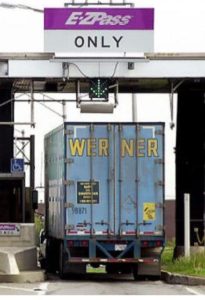 This post originally appeared as an NMA E-Newsletter in February 2019. Abuses by tolling authorities continue to mount. The lawsuit filed last year in U.S. District Court by Owner-Operator Independent Drivers Association and the NMA against the Pennsylvania Turnpike Commission for collecting inflated tolls to pay for projects unrelated to the operation and maintenance of the Turnpike continues under the purview of a federal judge. (Update: In March, the judge ruled against the NMA and OOIDA but left the door open for an appeal which is currently moving forward.) She is considering constitutional arguments involving the U.S. Commerce Clause. In another class action suit filed in 2018, the New Jersey Turnpike Authority is accused of overcharging E-ZPass administrative fees.
This post originally appeared as an NMA E-Newsletter in February 2019. Abuses by tolling authorities continue to mount. The lawsuit filed last year in U.S. District Court by Owner-Operator Independent Drivers Association and the NMA against the Pennsylvania Turnpike Commission for collecting inflated tolls to pay for projects unrelated to the operation and maintenance of the Turnpike continues under the purview of a federal judge. (Update: In March, the judge ruled against the NMA and OOIDA but left the door open for an appeal which is currently moving forward.) She is considering constitutional arguments involving the U.S. Commerce Clause. In another class action suit filed in 2018, the New Jersey Turnpike Authority is accused of overcharging E-ZPass administrative fees.
But it may take more stories like the one below from a couple in Delaware to illustrate just how predatory the tolling system can be. The couple’s wife sent us the letter that follows. It is similar to one she forwarded to several Delaware state officials detailing her family’s untenable predicament at the hands of the Delaware E-ZPass system.
Dear Delaware,
For the first time in my life, we have contemplated moving. I have never been so brokenhearted at the way I have been treated from the state that I love.
I have had an E-Zpass account since 2003. As I write this, there is a positive balance of $27.12 in the account. My husband’s truck was due for renewal on January 23, 2019. When I went to do the online renewal a few weeks before that, on January 3rd, the attempt failed. My husband called DMV and was told because of E-ZPass violations there were registration blocks on both of our vehicles.
As we started to peel away the layers, it turned out that the blocks were due to over $10,000 in E-ZPass violations. No typo─$10,000 owed on an account that continues to show a surplus when we check the balance. How is that possible?
We were shocked to appear to be blatant toll violators. You would think there would be flags, steps of progression to alert us to mounting penalties long before blocks were placed on our vehicle registrations. Closing our account, blocking our transponders, a notice from the state that there was a serious issue. But none of that occurred.
We were directed to speak to the collection agency that E-ZPass couldn’t help at that point until we cleared up the penalty debt. In turn, the agency said they were just following E-ZPass directions. To dispute the debt, we must do so in writing to the agency, a process they said would take six to nine weeks to investigate.
That’s an awful cycle. My husband and I work full time and have 3 children. Now neither of us has a vehicle to drive to work.
I spoke to an administrator at the Delaware DMV. He advised not to waste my time trying to resolve the matter with the collection agency. He arranged for a supervisor from TransCore, which operates E-ZPass, to call me. The message she left was unyielding: The account was past due and all unpaid tolls and penalties would have to be resolved. The payment plan she laid out would require an initial payment of over $2,500 and then nine monthly installments of more than $900 each.
I have called the supervisor back at least five times without getting a response. In the meantime I’ve had two E-ZPass employees tell me that they didn’t see any outstanding tolls in our account, and that the money owed is all from administrative late fees. Later I was told we have $233.50 of past-due tolls that date back to 2006. Yet throughout that time, we continued to add money to the account to maintain a positive balance. All the while $10,000 worth of surcharges were apparently piling up. I ask again, how is that possible?
Despite multiple requests, E-ZPass hasn’t provided any detail supporting their claim against us. I suppose because it has successfully blocked the registration renewals of our vehicles, it feels it has us over a barrel.
I hope that our state legislators will see this as a concern. The class action litigation filed last year in New Jersey for alleged overcharging of late penalties where E-ZPass systems were involved shows our case in Delaware is not an isolated incident.
Even loan sharks would be in awe of an enterprise that can turn a past-due balance of $200 into a crippling $10,000 debt. If she hasn’t already, the Delaware attorney general as top consumer protection official in the state should launch an investigation into these case, and other state attorneys general in the E-ZPass network should pay close attention.
If you would like to send us a motorist rights post for the Driving in America Blog, please contact the National NMA Office at nma@motorists.org. Also, if you are not yet an NMA member, consider joining today to help us promote motorists rights across the country (note: Arthur Miller, Co-Publisher of NewYorkTruckStop.com is a NWA member).
Leave a Reply